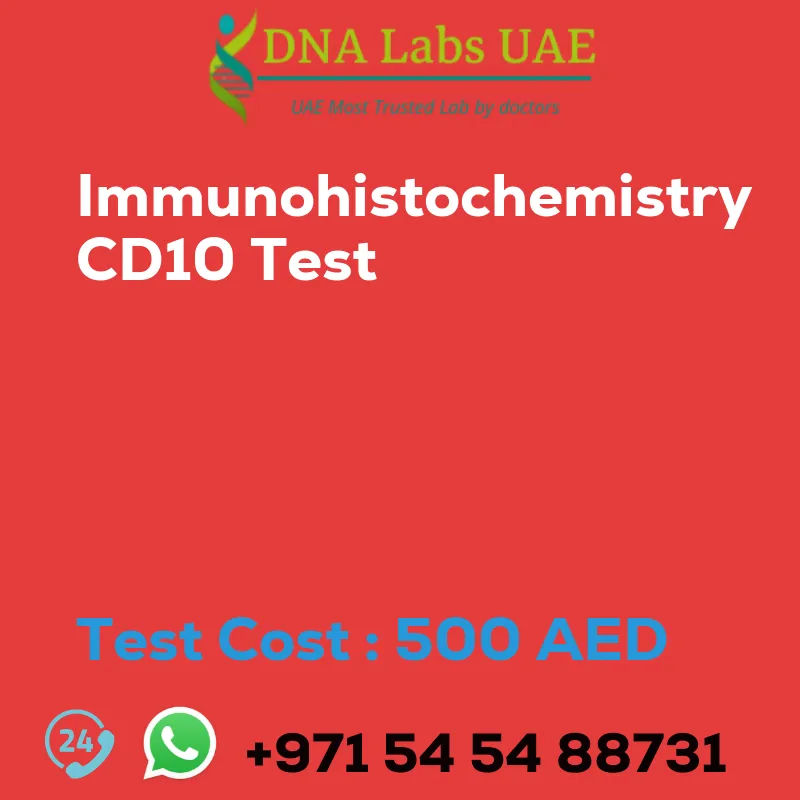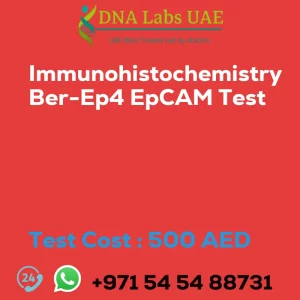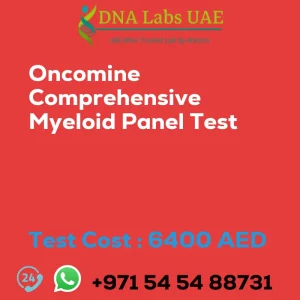IMMUNOHISTOCHEMISTRY CD10 Test
At DNA Labs UAE, we offer the IMMUNOHISTOCHEMISTRY CD10 Test at a cost of AED 500.0. This test is used for the diagnosis and classification of certain types of cancers, particularly lymphomas and leukemias.
Test Components
- Price: 500.0 AED
Sample Condition
Please submit tumor tissue in 10% Formal-saline or Formalin fixed paraffin embedded block. The sample should be shipped at room temperature. Additionally, provide a copy of the Histopathology report, site of biopsy, and clinical history.
Report Delivery
Sample: Daily by 6 pm
Report Block: 5 days
Tissue Biopsy: 5 days
Tissue large complex: 7 days
Method
The IMMUNOHISTOCHEMISTRY CD10 Test utilizes immunohistochemistry to detect the presence of CD10 protein in tissue samples.
Test Type
This test is specifically used for the diagnosis of cancer.
Doctor
This test is typically ordered by an Oncologist or Pathologist.
Test Department
The IMMUNOHISTOCHEMISTRY CD10 Test is conducted in our Test Department.
Pre Test Information
Please provide a copy of the Histopathology report, site of biopsy, and clinical history before conducting the test.
Test Details
The CD10 test, also known as immunohistochemistry CD10, is a laboratory test that uses antibodies to detect the presence of CD10 protein in tissue samples. CD10, also known as Neprilysin or Neutral Endopeptidase, is a cell surface protein that is expressed in various tissues, including lymphoid cells, epithelial cells, and endothelial cells.
The CD10 test is commonly used in the diagnosis and classification of certain types of cancers, particularly lymphomas and leukemias. It helps to differentiate between different subtypes of lymphomas and leukemias, as the expression of CD10 can vary depending on the specific type of cancer.
During the CD10 test, tissue samples are collected from the patient, usually through a biopsy or surgical resection. These tissue samples are then processed and embedded in paraffin wax or frozen for preservation. Thin sections of the tissue are then placed on glass slides and treated with antibodies that specifically bind to CD10 protein. If CD10 is present in the tissue, the antibodies will bind to it, and a color reaction can be visualized under a microscope.
The results of the CD10 test can help pathologists and oncologists in determining the type and prognosis of the cancer. For example, the presence of CD10 in lymphoma cells can indicate a germinal center B-cell origin, which may have implications for treatment decisions.
It is important to note that the CD10 test is just one of many tests used in the diagnosis and classification of cancers. It is typically used in conjunction with other tests, such as immunohistochemistry for other markers and genetic testing, to provide a comprehensive assessment of the tumor.
Overall, the CD10 test is a valuable tool in the field of pathology and oncology, helping to improve the accuracy of cancer diagnosis and classification.
| Test Name | IMMUNOHISTOCHEMISTRY CD10 Test |
|---|---|
| Components | |
| Price | 500.0 AED |
| Sample Condition | Submit tumor tissue in 10% Formal-saline OR Formalin fixed paraffin embedded block. Ship at room temperature. Provide a copy of the Histopathology report, Site of biopsy and Clinical history. |
| Report Delivery | Sample Daily by 6 pm; Report Block: 5 days Tissue Biopsy: 5 days Tissue large complex : 7 days |
| Method | Immunohistochemistry |
| Test type | Cancer |
| Doctor | Oncologist, Pathologist |
| Test Department: | |
| Pre Test Information | Provide a copy of the Histopathology report, Site of biopsy and Clinical history. |
| Test Details |
The CD10 test, also known as immunohistochemistry CD10, is a laboratory test that uses antibodies to detect the presence of CD10 protein in tissue samples. CD10, also known as Neprilysin or Neutral Endopeptidase, is a cell surface protein that is expressed in various tissues, including lymphoid cells, epithelial cells, and endothelial cells. The CD10 test is commonly used in the diagnosis and classification of certain types of cancers, particularly lymphomas and leukemias. It helps to differentiate between different subtypes of lymphomas and leukemias, as the expression of CD10 can vary depending on the specific type of cancer. During the CD10 test, tissue samples are collected from the patient, usually through a biopsy or surgical resection. These tissue samples are then processed and embedded in paraffin wax or frozen for preservation. Thin sections of the tissue are then placed on glass slides and treated with antibodies that specifically bind to CD10 protein. If CD10 is present in the tissue, the antibodies will bind to it, and a color reaction can be visualized under a microscope. The results of the CD10 test can help pathologists and oncologists in determining the type and prognosis of the cancer. For example, the presence of CD10 in lymphoma cells can indicate a germinal center B-cell origin, which may have implications for treatment decisions. It is important to note that the CD10 test is just one of many tests used in the diagnosis and classification of cancers. It is typically used in conjunction with other tests, such as immunohistochemistry for other markers and genetic testing, to provide a comprehensive assessment of the tumor. Overall, the CD10 test is a valuable tool in the field of pathology and oncology, helping to improve the accuracy of cancer diagnosis and classification. |








